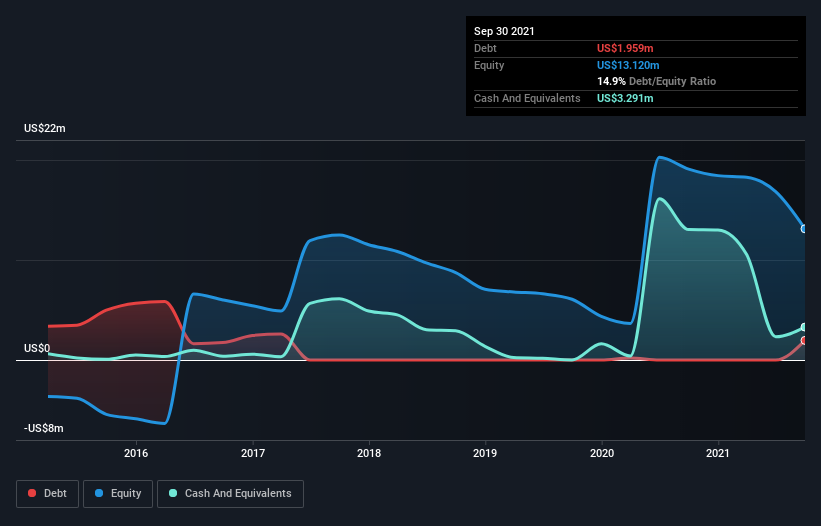
David Iben put it well when he said, 'Volatility is not a risk we care about. What we care about is avoiding the permanent loss of capital.' So it seems the smart money knows that debt - which is usually involved in bankruptcies - is a very important factor, when you assess how risky a company is. We note that SG Blocks, Inc. (NASDAQ:SGBX) does have debt on its balance sheet. But the real question is whether this debt is making the company risky.
When Is Debt Dangerous?
Generally speaking, debt only becomes a real problem when a company can't easily pay it off, either by raising capital or with its own cash flow. Part and parcel of capitalism is the process of 'creative destruction' where failed businesses are mercilessly liquidated by their bankers. However, a more common (but still painful) scenario is that it has to raise new equity capital at a low price, thus permanently diluting shareholders. By replacing dilution, though, debt can be an extremely good tool for businesses that need capital to invest in growth at high rates of return. The first thing to do when considering how much debt a business uses is to look at its cash and debt together.
Check out our latest analysis for SG Blocks
How Much Debt Does SG Blocks Carry?
The image below, which you can click on for greater detail, shows that at September 2021 SG Blocks had debt of US$1.96m, up from none in one year. But it also has US$3.29m in cash to offset that, meaning it has US$1.33m net cash.

How Strong Is SG Blocks' Balance Sheet?
The latest balance sheet data shows that SG Blocks had liabilities of US$10.8m due within a year, and liabilities of US$957.5k falling due after that. Offsetting this, it had US$3.29m in cash and US$4.05m in receivables that were due within 12 months. So it has liabilities totalling US$4.46m more than its cash and near-term receivables, combined.
Given SG Blocks has a market capitalization of US$23.9m, it's hard to believe these liabilities pose much threat. Having said that, it's clear that we should continue to monitor its balance sheet, lest it change for the worse. Despite its noteworthy liabilities, SG Blocks boasts net cash, so it's fair to say it does not have a heavy debt load! The balance sheet is clearly the area to focus on when you are analysing debt. But you can't view debt in total isolation; since SG Blocks will need earnings to service that debt. So if you're keen to discover more about its earnings, it might be worth checking out this graph of its long term earnings trend.
In the last year SG Blocks wasn't profitable at an EBIT level, but managed to grow its revenue by 2,038%, to US$37m. That's virtually the hole-in-one of revenue growth!
So How Risky Is SG Blocks?
By their very nature companies that are losing money are more risky than those with a long history of profitability. And the fact is that over the last twelve months SG Blocks lost money at the earnings before interest and tax (EBIT) line. Indeed, in that time it burnt through US$5.8m of cash and made a loss of US$9.0m. Given it only has net cash of US$1.33m, the company may need to raise more capital if it doesn't reach break-even soon. Importantly, SG Blocks's revenue growth is hot to trot. While unprofitable companies can be risky, they can also grow hard and fast in those pre-profit years. There's no doubt that we learn most about debt from the balance sheet. However, not all investment risk resides within the balance sheet - far from it. To that end, you should learn about the 4 warning signs we've spotted with SG Blocks (including 2 which are significant) .
If you're interested in investing in businesses that can grow profits without the burden of debt, then check out this free list of growing businesses that have net cash on the balance sheet.
New: Manage All Your Stock Portfolios in One Place
We've created the ultimate portfolio companion for stock investors, and it's free.
• Connect an unlimited number of Portfolios and see your total in one currency
• Be alerted to new Warning Signs or Risks via email or mobile
• Track the Fair Value of your stocks
Have feedback on this article? Concerned about the content? Get in touch with us directly. Alternatively, email editorial-team (at) simplywallst.com.
This article by Simply Wall St is general in nature. We provide commentary based on historical data and analyst forecasts only using an unbiased methodology and our articles are not intended to be financial advice. It does not constitute a recommendation to buy or sell any stock, and does not take account of your objectives, or your financial situation. We aim to bring you long-term focused analysis driven by fundamental data. Note that our analysis may not factor in the latest price-sensitive company announcements or qualitative material. Simply Wall St has no position in any stocks mentioned.
About NasdaqCM:SGBX
Safe & Green Holdings
Designs and modifies code-engineered cargo shipping containers and purpose-built modules for commercial, industrial, and residential building construction in the United States.
Moderate and slightly overvalued.
Market Insights
Community Narratives



